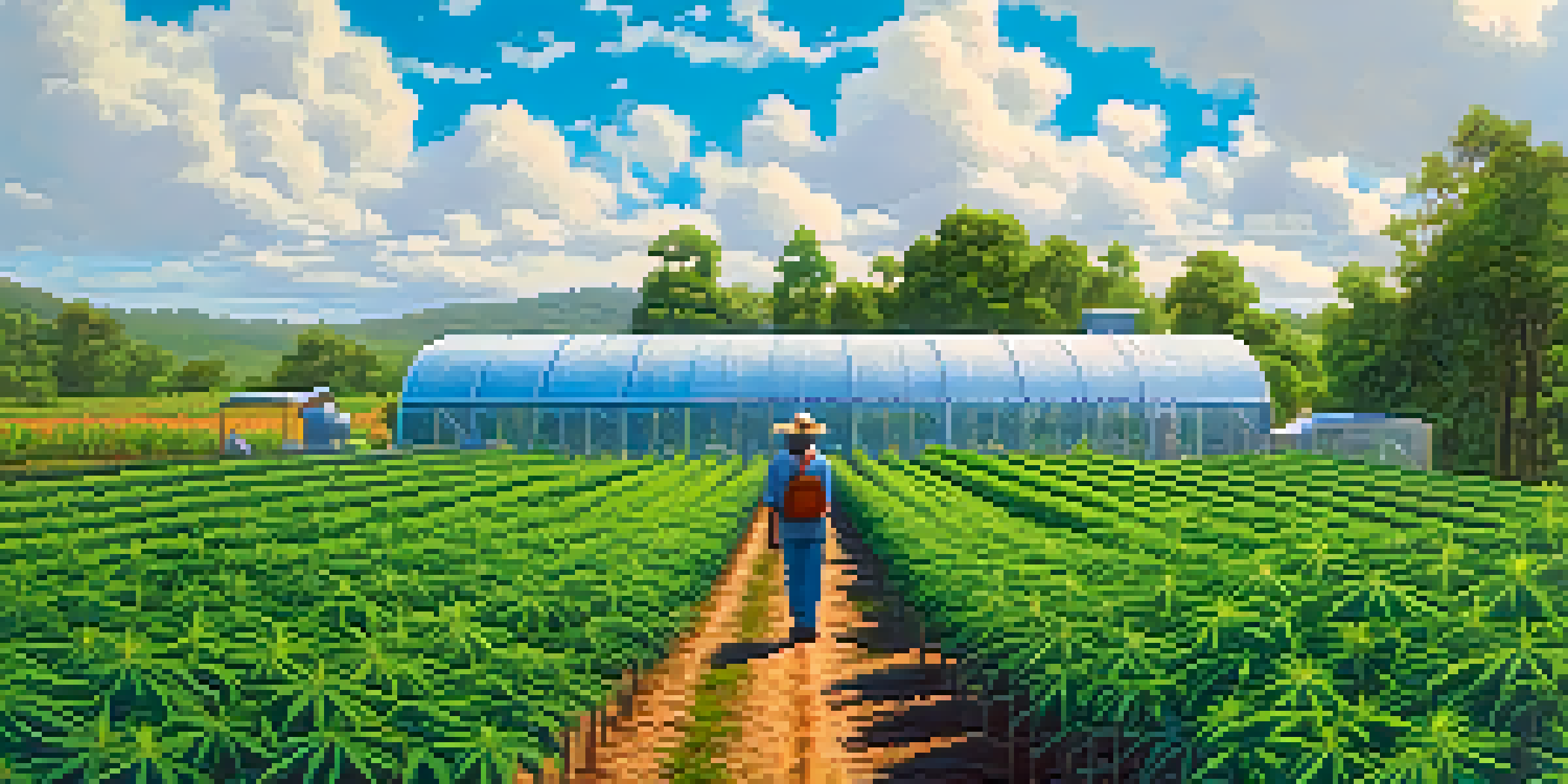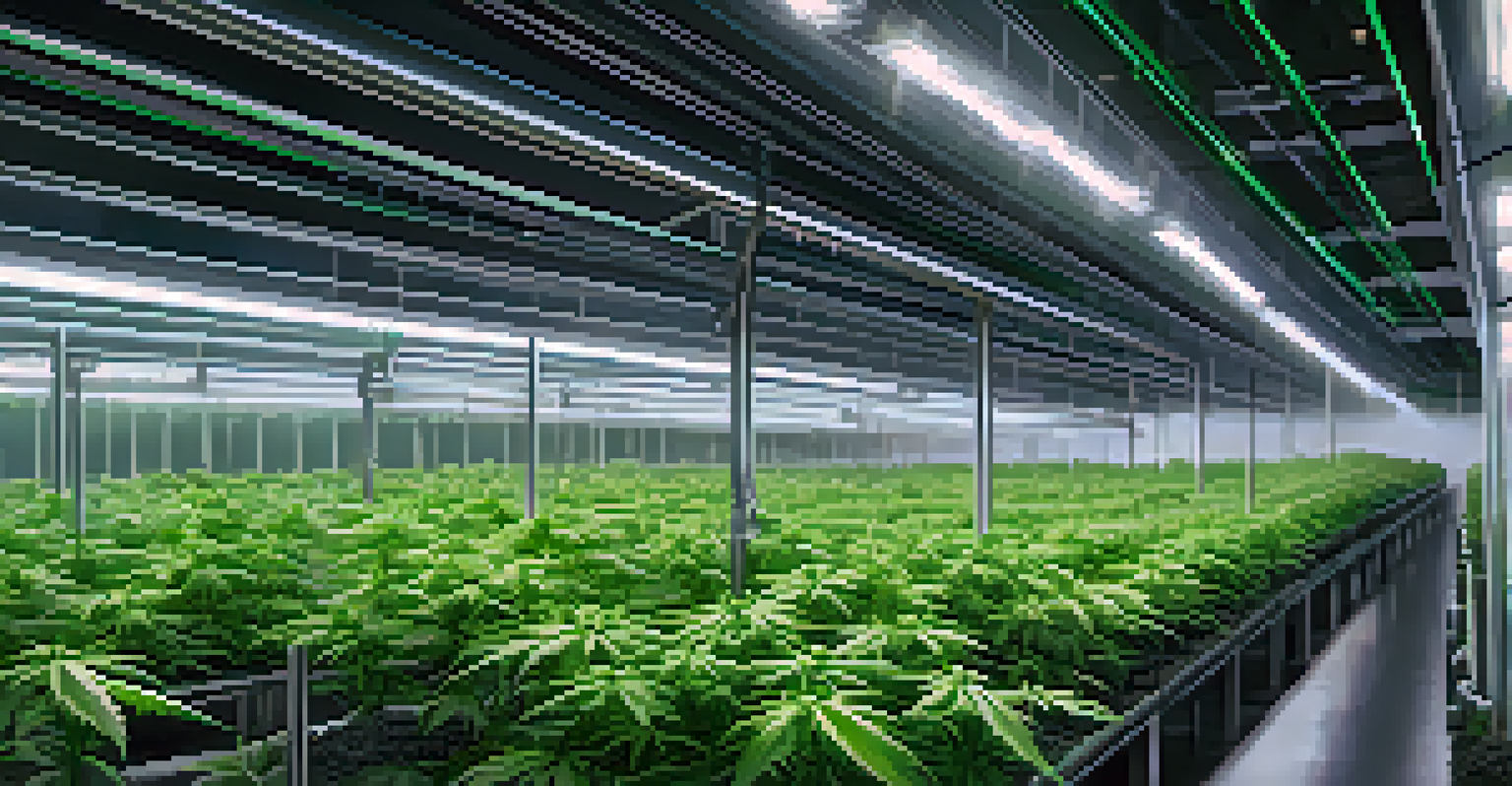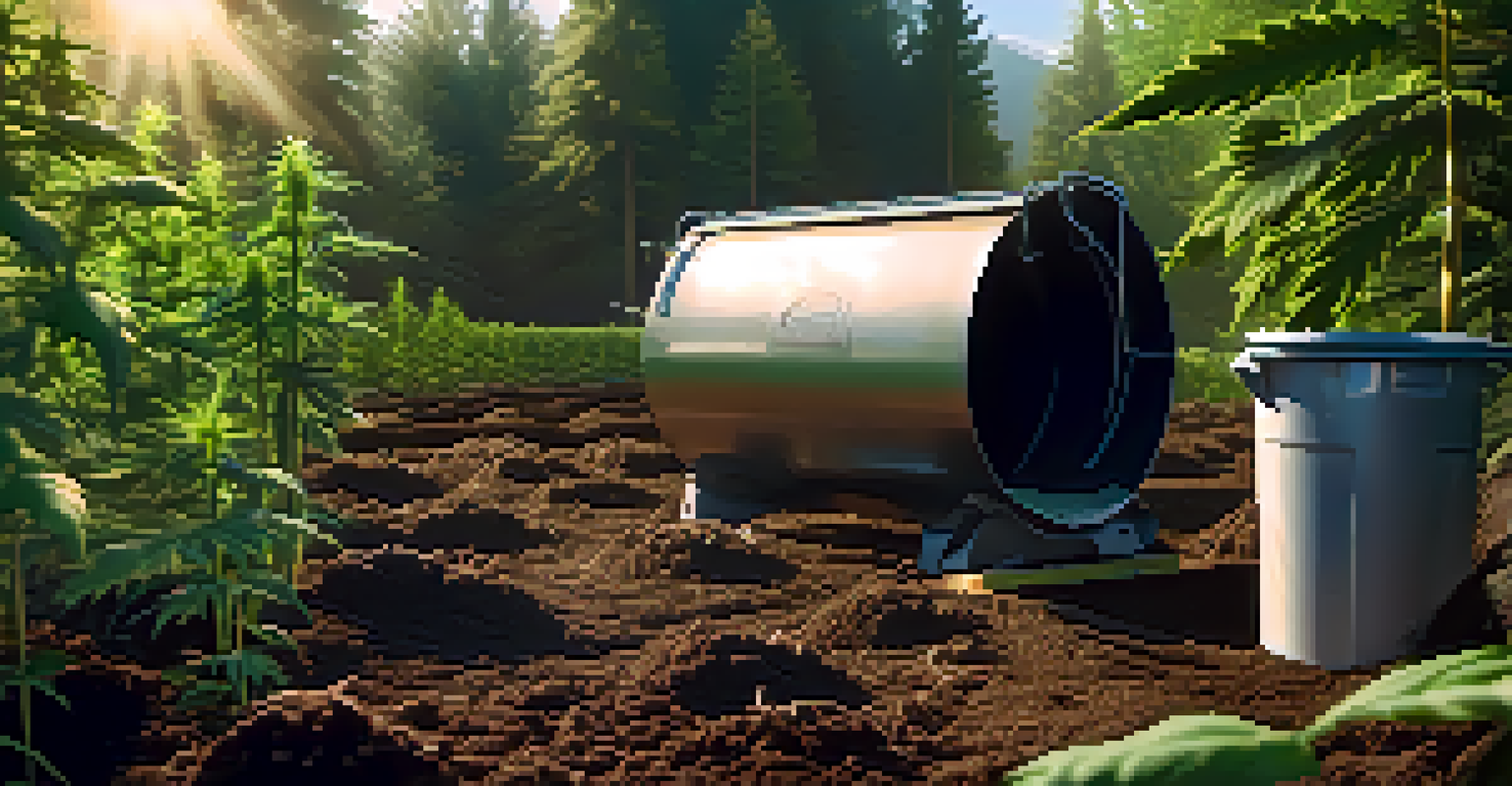Environmental Regulations in the Cannabis Industry

The Importance of Environmental Regulations in Cannabis
Environmental regulations play a crucial role in the cannabis industry, ensuring that cultivation and production methods are sustainable and safe. As cannabis becomes increasingly mainstream, there’s a growing recognition of the need to protect our ecosystems. These regulations help mitigate pollution, conserve water, and ensure responsible land use. Essentially, they create a framework that balances industry growth with environmental protection.
We won’t have a society if we destroy the environment.
For instance, regulations can dictate how much water a grower can use, which is vital in regions prone to drought. By enforcing these standards, the industry is pushed towards more efficient practices, such as rainwater harvesting or recirculating irrigation systems. This not only fosters sustainability but also enhances the reputation of the cannabis industry as a responsible sector. It’s a win-win for businesses and the environment alike.
Moreover, compliance with these regulations can lead to better product quality. When producers focus on sustainable practices, they often yield healthier plants, resulting in higher-quality products for consumers. This alignment of environmental responsibility and product excellence is essential for the long-term growth of the cannabis market.
Federal vs. State Regulations in Cannabis Cultivation
In the U.S., cannabis regulations can be a patchwork of federal and state laws, creating a complex landscape for cultivators. While cannabis remains illegal at the federal level, many states have adopted their own regulations that often emphasize environmental protections. This discrepancy can lead to confusion, especially for growers who want to comply with both sets of laws.

For example, some states may require specific waste disposal methods for cannabis byproducts, while the federal government has no guidelines. This inconsistency can complicate operations and increase costs for businesses trying to navigate both regulatory environments. Understanding these nuances is critical for anyone looking to engage in the cannabis industry sustainably.
Sustainability in Cannabis Cultivation
Environmental regulations promote sustainable practices in the cannabis industry, balancing growth and ecological protection.
Ultimately, this regulatory duality can spur innovation. Growers often seek creative solutions to comply with varying standards, leading to the development of new technologies and practices that benefit the environment. As the industry evolves, there is hope for more harmonized regulations that prioritize both compliance and ecological responsibility.
Water Usage and Conservation Practices in Cannabis
One of the most pressing environmental issues in cannabis cultivation is water usage. Cannabis plants require significant amounts of water, which can strain local water supplies, especially in arid regions. Consequently, growers are increasingly adopting conservation practices to minimize their water footprint, such as drip irrigation and moisture monitoring systems.
Sustainability is no longer about doing less harm. It’s about doing more good.
These methods not only reduce water consumption but also enhance plant health, leading to better yields. For instance, drip irrigation delivers water directly to the plant roots, ensuring efficient absorption and minimizing evaporation. By implementing these techniques, cultivators can significantly decrease their environmental impact while still producing high-quality cannabis.
Additionally, some growers are exploring alternative water sources, such as rainwater collection systems. This approach not only conserves municipal water supplies but also reduces costs. As the industry continues to grow, the adoption of innovative water management practices will be crucial for sustainable cannabis cultivation.
Soil Health and Sustainable Cultivation Techniques
Healthy soil is the foundation of successful cannabis cultivation, and sustainable practices are essential for maintaining soil health. Techniques like crop rotation, cover cropping, and reduced tillage can enhance soil structure, fertility, and biodiversity. These practices promote a thriving ecosystem that supports plant growth while minimizing the need for chemical fertilizers and pesticides.
By focusing on soil health, growers can also reduce their environmental impact. For example, using organic compost not only enriches the soil but also helps sequester carbon, contributing to climate change mitigation. This holistic approach benefits both the plants and the surrounding environment, creating a more resilient agricultural system.
Navigating Regulatory Challenges
The complex landscape of federal and state regulations can create confusion for cannabis growers, emphasizing the need for compliance.
Furthermore, educating growers on sustainable soil management practices can lead to widespread adoption across the industry. As more cultivators prioritize soil health, the cannabis sector can position itself as a leader in sustainable agriculture, paving the way for a greener future.
Waste Management Strategies in the Cannabis Industry
Effective waste management is a significant challenge in the cannabis industry, given the byproducts generated during cultivation and processing. From plant trimmings to packaging materials, managing waste responsibly is crucial for minimizing environmental impact. Many cannabis businesses are adopting strategies that focus on recycling, composting, and reducing single-use plastics.
For example, some cultivators are composting plant waste to create nutrient-rich soil amendments, reducing the need for synthetic fertilizers. This practice not only diverts waste from landfills but also enhances soil health, creating a closed-loop system that benefits the environment. By prioritizing waste reduction, the cannabis industry can foster a more sustainable future.
Additionally, implementing robust recycling programs can help address the issue of plastic packaging. As consumers demand eco-friendly options, cannabis companies are exploring biodegradable materials and reusable packaging solutions. These efforts demonstrate a commitment to sustainability and resonate with environmentally-conscious consumers.
Air Quality Regulations and Their Impact on Cannabis Cultivation
Air quality is a vital aspect of environmental regulations that affects the cannabis industry. Cultivation facilities can produce odors, volatile organic compounds (VOCs), and other emissions that may impact surrounding communities. To address these concerns, many jurisdictions have implemented regulations that require growers to manage air quality effectively.
To comply with these regulations, cannabis growers often invest in advanced ventilation and filtration systems. For instance, carbon scrubbers can help reduce odors, ensuring that neighboring residents aren’t disturbed. By prioritizing air quality, cultivators can foster positive relationships with their communities while maintaining compliance with environmental standards.
Future of Eco-Friendly Regulations
As public awareness grows, cannabis regulations are expected to evolve towards stricter sustainability standards, driving innovation in cultivation.
Moreover, adhering to air quality regulations can enhance overall operational efficiency. By creating a clean and controlled environment, growers can optimize plant health and productivity. Ultimately, these regulations not only protect the environment but also contribute to the success of cannabis businesses.
The Role of Certifications and Green Initiatives
As the cannabis industry matures, certifications and green initiatives are becoming increasingly important. These programs help businesses demonstrate their commitment to environmental sustainability, providing a competitive edge in a crowded market. Certifications like Organic, Clean Green Certified, or Certified Naturally Grown signal to consumers that a product meets specific environmental standards.
Participating in these initiatives can also foster a culture of accountability within the industry. As more businesses strive for certification, it can drive overall improvements in environmental practices across the sector. This collective effort not only benefits the planet but also elevates the industry’s reputation in the eyes of consumers and regulators.

Furthermore, green initiatives can lead to cost savings for businesses in the long run. By adopting efficient practices and reducing waste, cultivators can lower operational costs while contributing to environmental preservation. In this way, pursuing sustainability isn’t just good for the planet; it’s also a smart business move.
Future Trends in Environmental Regulations for Cannabis
Looking ahead, environmental regulations in the cannabis industry are likely to evolve as the market matures and public awareness grows. As consumers demand more sustainable products, regulators may introduce stricter guidelines to ensure environmentally responsible practices. This evolution presents both challenges and opportunities for cannabis businesses.
For instance, cultivators may need to invest in new technologies and practices to comply with emerging regulations. However, these changes can also drive innovation and lead to the development of more sustainable cultivation methods. Staying ahead of the curve will be essential for businesses that want to thrive in this dynamic landscape.
Moreover, collaboration between industry stakeholders, regulators, and environmental organizations will be crucial in shaping the future of cannabis regulations. By working together, they can create a set of standards that not only protect the environment but also support the growth of a responsible cannabis industry. The future looks promising, with sustainability at the forefront of cannabis cultivation.